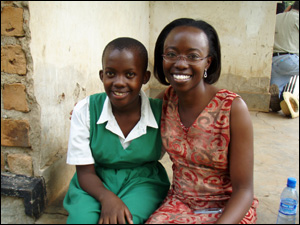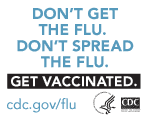CDC In the News
Public Health Is Global Health
An Innovative Approach to Fighting Disease in Uganda
Published: September 17, 2007

Fatuma Nansimbe (left), a recipient of the Basic Care Package, with Dr. Flora Banage (right), a project officer in the CDC-Uganda office.
The Centers for Disease Control and Prevention and the University of North Carolina School of Public Health will broadcast a global health case study on September 27, the third in its series of Public Health Grand Rounds programs highlighting CDC's Health Protection Goals. To register, click here.
The September 27th program Public Health Is Global Health: An Innovative Approach to Fighting Disease in Uganda, airing from 2:00pm to 3:00pm ET, focuses on the agency's Healthy People in a Healthy World Goal by spotlighting an innovative intervention to improve health—the Basic Care Package, which was developed through a collaborative effort of CDC, the President's Emergency Plan for AIDS Relief, the Ugandan Ministry of Health, The AIDS Support Organization, and Population Services International (PSI)/Uganda.
This lifesaving resource was developed after research conducted in rural Uganda and elsewhere in Africa identified effective ways to promote health and reduce HIV/AIDS infections. The Basic Care Package includes these components:
• Two insecticide-treated mosquito nets
• Water vessel, filter cloth, and bleach solution to disinfect water
• Information on how to obtain HIV family counseling, HIV testing services, and cotrimoxazole (an antibiotic that reduces opportunistic infections among HIV positive persons)
Register and Watch!
Public Health Grand Rounds
September 27, 2:00pm ET
Public Health is Global Health: An innovative approach to fighting disease in Uganda
To register and learn more go to www.publichealthgrandrounds.unc.edu
Free continuing education credits
• Educational materials on how to use the components in the package
• Condoms when requested by distribution site
In the last two and a half years, Population Services International (PSI)-Uganda has distributed more than 120,000 Basic Care Packages throughout Uganda to HIV-positive people and their families. Studies conducted by CDC and its partners have shown that the daily use of the antibiotic Cotrimoxazole (often called Bactrim in the U.S.) reduced mortality by 46 percent; provision of insecticide-treated bed nets reduced malaria incidence by 50 percent; and use of a simple home-based safe water system reduced diarrhea by 25 percent.
The Grand Rounds will explore valuable lessons learned in Uganda about the usefulness of combining interventions to prevent multiple diseases; the importance of applying research and evidence-based interventions; designing sustainable interventions; and getting buy-in at the national and local levels to increase long-term health impact.
Save the date for the next Public Health Grand Rounds
On November 29, 2007, the Public Health Grand Rounds will feature Public Health Legal Preparedness: From Emergencies to Urgencies. This program spotlights a case study from New York City, where the local department of health has effectively used law to impact public health. Legal interventions include phasing out the use of artificial trans fats in restaurants and other food-service establishments; prohibiting smoking in public places and workplaces; and requiring the reporting of diabetics' blood sugar level to the department of health. New York City's legal interventions for chronic diseases have been instrumental in achieving health protection and have national application and significance.
Each PHGR broadcast will also be available for replay via Webcast.
Content source: Centers for Disease Control and Prevention

